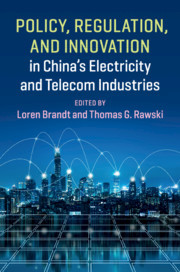Description
Policy, Regulation and Innovation in China's Electricity and Telecom Industries
Coordinators: Brandt Loren, Rawski Thomas G.
Openness and competition sparked major advances in Chinese industry. Recent policy reversals emphasizing indigenous innovation seem likely to disappoint.
Language: English
Subject for Policy, Regulation and Innovation in China's Electricity...:
Policy, Regulation and Innovation in China's Electricity and Telecom Industries
Publication date: 05-2019
526 p. · 15.3x22.8 cm · Paperback
Publication date: 05-2019
526 p. · 15.3x22.8 cm · Paperback
Policy, Regulation and Innovation in China's Electricity and Telecom Industries
Publication date: 05-2019
526 p. · 15.7x23.5 cm · Hardback
Publication date: 05-2019
526 p. · 15.7x23.5 cm · Hardback
Description
/li>Contents
/li>Biography
/li>
The scale of China's innovation ambitions inspires worldwide commentary, much of it poorly informed. Focusing on electricity, telecommunication and semiconductors, this book offers a richly detailed account of China's innovation efforts. Massive application of human, policy and financial resources shows great promise, but institutional obstacles, conflicting objectives, ill-advised policies and Soviet-era legacies inject inefficiencies, resulting in a complex mosaic of success and failure in both technical and commercial dimensions. State Grid leads the world in high-voltage power transmission, while domestic semiconductors lag behind the international frontier. Electricity and telecom providers record impressive technical advances, but overinvestment and inefficient operation contribute to high costs and prices. Nuclear power combines technical excellence with commercial weakness. Cost reduction rather than new technology underpins commercial success in solar materials. The book's granular studies look beyond specific technologies to incorporate the policy matrix, regulatory structures and global developments into the appraisal of China's innovation achievements.
1. Policy, regulation and innovation in China's electricity and telecom industries Loren Brandt and Thomas G. Rawski; 2. Electricity and telecom regulation: China in context Irene S. Wu; 3. Local government and firm innovation: China's clean energy sector Margaret M. Pearson; 4. Electricity systems integration challenges: a local perspective Michael Davidson; 5. When global technology meets local standards: re-assessing China's communications policy in the age of platform innovation Eric Thun and Timothy Sturgeon; 6. State grid: an entrepreneurial and innovative state enterprise Yi-chong Xu; 7. Growth, upgrading and limited catch-up in China's semiconductor industry Douglas B. Fuller; 8. Growth, upgrading and excess cost in China's electric power sector Thomas G. Rawski; 9. China's development of wind and solar power Loren Brandt and Luhang Wang; 10. Capability upgrading and catch-up in civil nuclear power: the case of China Ravi Madhavan, Thomas G. Rawski and Qingfeng Tian.
Loren Brandt is the Noranda Chair Professor of Economics and International Trade at the University of Toronto. With Thomas G. Rawski, he was co-editor and a major contributor to China's Great Economic Transformation (Cambridge, 2008). His current research focuses on issues of industrial upgrading in China, inequality dynamics, and China's long-run economic growth and structural change.
Thomas G. Rawski is emeritus Professor of Economics and History at the University of Pittsburgh. Recent publications include Tales from the Development Frontier (2013), which he co-authored. With Loren Brandt, he was co-editor and a major contributor to China's Great Economic Transformation (Cambridge, 2008). His research focuses on the development and modern history of China's economy, including studies of China's reform mechanism and achievements.
Thomas G. Rawski is emeritus Professor of Economics and History at the University of Pittsburgh. Recent publications include Tales from the Development Frontier (2013), which he co-authored. With Loren Brandt, he was co-editor and a major contributor to China's Great Economic Transformation (Cambridge, 2008). His research focuses on the development and modern history of China's economy, including studies of China's reform mechanism and achievements.
© 2024 LAVOISIER S.A.S.




